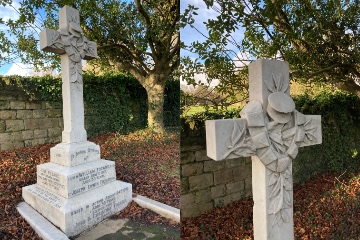William Fozard was born in 1882 at Rigton, one of eight children born to John and Christiana Fozard. At the time of the 1911 Census, he was a 29-year-old gardener living with his parents and three sisters, Mabel, Hetty and Ada, at 3 Rosehurst Terrace in Pannal. William was still living at Rosehurst Terrace, but now employed as a driver, when he attested for army service on 10th December 1915. He was called up on 9th February 1916 and posted to the Royal Flying Corps as an air mechanic second class. His promotion to air mechanic first class came with a posting to 13th Reserve Squadron at Dover on 1st May 1917.
On Friday, 1st June 1917 William joined Second Lieutenant Nathaniel Fuhrmann Clarke on a flight from Dover to Farnborough. En-route, Clarke, piloting the B.E.2c, lost his way and landed in a Berkshire field between Hurst and Wokingham at Warren Farm. Shortly after taking off again, the B.E.2c fell to the ground, killing both William and Clarke. William's sister, Emily Ann, identified her brother's body and was reported, unsurprisingly, to be "much distressed". The inquest, held on the day after the crash, heard from Walter Neighbour, working foreman and steward at Warren Farm:
…he first saw the machine the previous morning about 8 o’clock coming from the south-west. The machine circled round about three times with the apparent intention of landing, and ultimately it alighted in the upper field of the farm. He and his carter [Henry George Sarjeant] proceeded to the spot, and witness was the first to speak to Lieutenant Clarke, who was the pilot. He told witness that he had lost his way. He got out his map and found the way and witness directed him. The officer told the mechanic that one of the ropes of the rudder was wrong, but after the mechanic had tried it he found it was all right. In a conversation with the mechanic Lieutenant Clarke remarked that when they were in the mist the pitot tube (air speed indicator) was bobbing up and down, which he did not like, but he did not say anything more about that.
Lieutenant Clarke had told Neighbour that they had had a good run from Dover at about 60 miles an hour, but at Guildford got into a mist.
Neighbour went on to describe what happened after the B.E.2c took off again:
It was almost 9 o’clock, probably 8.45 when they re-started. Everything was straight as far as I could notice. It was not the want of petrol which caused the accident as I saw the mechanic pump some in. We helped them back from the middle of the field to the north-east and so that they should have a good start to fly over Mr. Stimpson’s house, which they intended to do.
They strapped themselves in and Lieutenant Clarke saying “all clear behind” and waving good-bye to us went off. I thought the ascent was very fair. I saw a machine go up about three months ago. They went half-way over the field and then rose. The machine negotiated the house all right and then made a complete circle of three fields. It was not flying at a great height. It then started round again, and when it had proceeded about half-way round the machine appeared to me to come down slightly, as though the officer intended landing again. Then we saw the tail of the machine drop slightly, and the next moment we observed it come nose down to the ground…My carter went [to the spot] before me, as I went back to telephone to the police…When I arrived I found the lieutenant unconscious. I understood from the carter that the mechanic was dead; the machine was on the top of him. I helped to get the officer out and then I cut open his helmet…I went off to meet the doctor, who had been sent for. I did not see the lieutenant breathe his last. He was dead before I got back.
The doctor, Dr. Thomas Bokenham, testified that William had many broken bones and a broken neck, and that death must have been almost instantaneous.

On the Wednesday after the crash, a squadron of airmen circled in tribute over All Saints' Church in Kirkby Overblow as a memorial service was being held for William. Following the service, his body was interred in the village cemetery, eight members of the Royal Flying Corps acting as bearers. William's brother, Joseph Edwin, who would later be killed in action with the Welsh Guards, is also commemorated on William's gravestone.
